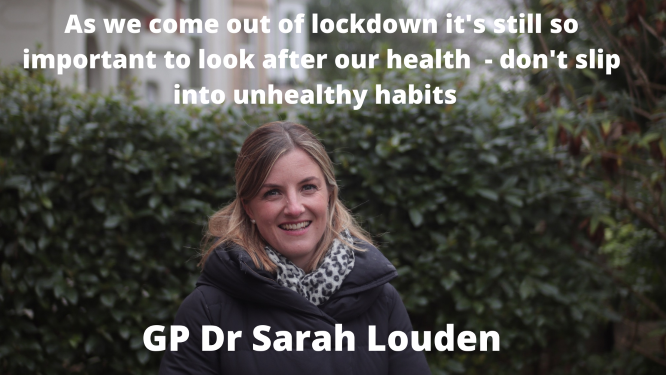Dont let Spring 2021 hammer your health

We’re all looking forward to the Spring of 2021 – but don’t let it hammer your health. That is the message from health campaigners in the North East as pubs reopen outdoors from Monday.
Fresh and Balance – the North East’s tobacco and alcohol harm prevention programmes – are encouraging people to stay healthy and safe and avoid potential pitfalls of more regular drinking or smoking which can weaken the immune system and harm physical and mental health.
The Covid pandemic has brought huge pressures and while 2020 saw a surge in smokers quitting (1) and some people cutting down on alcohol, the same pressures led to over 8m people drinking at risky levels in 2020 (2). A survey by Balance also found that nearly half (44%) of drinkers who were drinking more since Covid felt worse as a result.(3)
Easing of Covid restrictions, from outdoor socialising to pubs re-opening, can bring with them their own temptations and risks:
- More regular binge drinking can harm our health, make us feel more tired and depressed, weaken the immune system and lead to weight gain.
- If you’ve quit smoking, drinking outdoors with your friends can risk breaking your resolve and put you in situations where you feel tempted to smoke.
- People who both smoke and drink have a higher risk of mouth and throat cancer. (4)
- Both alcohol and tobacco are linked with a higher risk of cancer, heart attack and stroke and can worsen stress and anxiety.
Ailsa Rutter OBE, Director of Fresh, said: “Life returning to some sort of normal is something most of us welcome after the long winter. We’ve all struggled during the pandemic but while some people have used this time to quit smoking or cut down on drinking, many others have struggled with one or both. Spring can be a new start to get out and feel good again – but can also bring pitfalls for health which you might end up regretting.
“If you’ve quit smoking, don’t kid yourself that you can have the odd cigarette which can undo the brilliant achievement of quitting and get you hooked again. If necessary, try to avoid putting yourself into situations where you might be tempted to smoke. Vaping is much less harmful than smoking and could be one good way to switch from tobacco.”
Sue Taylor, Acting Head of Alcohol Policy for Balance, said: “When it comes to alcohol, we know that lockdown has created worrying drinking patterns which can make people feel worse and cause more family tension. People are looking forward to socialising but drinking too much alcohol does not need to be part of it – at the end of the day alcohol is a toxin and a depressant which can harm health and cause hangovers, tiredness and low mood.
“It can sometimes feel we are surrounded by alcohol, from advertising on TV to our weekly shop in the supermarket. Whether or not you’ve felt your drinking creeping up during lockdown, now is a really important time to be looking after ourselves and our families, mentally and physically, and that includes trying to stick within the limits of 14 units per week.”
Dr Sarah Louden, a GP from Newcastle, said: “As we come out of lockdown we completely understand that a lot of people will want to enjoy the opportunities to socialise with friends and family again, however it is still really important to look after our health.
“It may be tempting to drink more alcohol or reach for a cigarette when socialising outdoors but we don’t want people to slip into habits that can be hard to break and have long term health risks. Some of the best things you can do for your health – both now and in the longer term – are to not smoke, try to keep to a healthy weight and don’t drink too much alcohol. This can help reduce your risk of heart disease, strokes and certain cancers and boost your immune system and mental health. If you are struggling speak to your GP who can offer further advice.”
Deaths from alcohol hit a new high during the first nine months of 2020, up 16% on the same months in 2019 and the biggest toll recorded since records began in 2001. Alcohol is now understood to be linked to heart disease, stroke and 7 types of cancer, while deaths linked to liver disease have risen a staggering 400% in 40 years. Alcohol can also contribute to the worsening of symptoms of many mental health problems, especially low mood and anxiety. (5)
Smoking is one of the biggest causes of death and illness with around 74,600 deaths attributable to smoking each year in England. Smoking on average shortens life expectancy by 10 years. A recent report published (23 March) by Action on Smoking and Health (ASH) shows smokers in England on average need social care at the age of 63; 10 years earlier than non-smokers, with 1.5 million people needing help with everyday tasks due to smoking. (6)
FIVE TIPS FOR MAKING THE MOST OF LIFE OUT OF LOCKDOWN
1: Take more drink-free days, and on the days you do drink have a glass of something non-alcoholic for each drink you have. Despite alcohol advertising, don’t feel you have to drink.
2: Be on your guard against situations in which you might feel tempted to smoke. Using an electronic cigarette is much less harmful than smoking and evidence shows vaping is 70% more effective in helping smokers quit than nicotine replacement therapy. Visit https://www.nhs.uk/better-health/quit-smoking/
3: Know your alcohol units – Chief Medical Officer guidance is to not exceed more than 14 units a week. Home poured measures can often differ from standard measures used in pubs. Visit the ReducemyRisk.tv website to try a free quiz to see how well you know how many units are in a pint or a glass of wine – http://reducemyrisk.tv/
4: If you’re trying to stick to a health goal like limiting your alcohol or quitting smoking, it might be worth talking to friends or family before meeting up so everyone understands and can support you to stay on track.
5: The Try Dry app from Alcohol Change is a good way to understand your drinking pattern and track your progress by using the ‘My charts’ feature to see how much money you spend, units you drink and calories you consume over a time period. https://alcoholchange.org.uk/alcohol-facts/interactive-tools/the-dry-january-app-1
